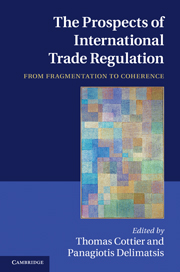Book contents
- Frontmatter
- Contents
- List of figures
- List of tables
- Contributors
- Preface and acknowledgements
- Table of cases
- List of abbreviations
- Introduction: fragmentation and coherence in international trade regulation: analysis and conceptual foundations
- PART I Constitutional issues in international trade regulation
- 1 The constitutionalisation of international trade law
- 2 Reflections on modes of decision-making in the World Trade Organization
- 3 Regionalism: moving from fragmentation towards coherence
- PART II Reforming specific areas of trade regulation
- PART III ‘Trade and…’ linkages
- Index
- References
2 - Reflections on modes of decision-making in the World Trade Organization
from PART I - Constitutional issues in international trade regulation
Published online by Cambridge University Press: 26 April 2011
- Frontmatter
- Contents
- List of figures
- List of tables
- Contributors
- Preface and acknowledgements
- Table of cases
- List of abbreviations
- Introduction: fragmentation and coherence in international trade regulation: analysis and conceptual foundations
- PART I Constitutional issues in international trade regulation
- 1 The constitutionalisation of international trade law
- 2 Reflections on modes of decision-making in the World Trade Organization
- 3 Regionalism: moving from fragmentation towards coherence
- PART II Reforming specific areas of trade regulation
- PART III ‘Trade and…’ linkages
- Index
- References
Summary
KEY MESSAGES
The chapter focuses on selected challenges in decision-making within the WTO, vertical decision-making focusing on firms, and horizontal decision-making addressing the WTO's judicial interactions with other international organisations.
∙ There are various interpretations of the notions of legitimacy and accountability which in turn have an impact on the way we address the challenges to decision-making.
∙ The negotiation process needs improvement. Streamlining decision-making could include strengthening the role of the WTO Secretariat.
∙ There are a variety of decision-making rules in the WTO, but consensus trumps all. Therefore, when reforming consensual decision-making more attention needs to be paid to the different natures of legislative objectives.
∙ The role of corporations and the effects of domestic political systems are important in understanding current dynamics of WTO negotiations.
∙ Overlapping authorities pose a challenge for decision-making (horizontal decision-making). Here the fragmentation–coherence issue is most prevalent. Finding the ‘institutional sensitivity’ to cooperate across international organisations is pivotal.
Introduction
International organisations (IOs) have come under increased scrutiny in recent years. Various notions including accountability, legitimacy or performance have characterised the animated public and scholarly debates. There is growing consensus – outside the inner circle of decision-makers within IOs – that reform is necessary to tackle global externalities more swiftly and efficiently. Reform projects mainly relate to designing new mandates and delegating more powers to IOs, as the current crises in the global financial architecture and unfolding summit activities suggest. However, reform needs to go beyond designing new tasks for IOs. Reform should also address governance issues.
- Type
- Chapter
- Information
- The Prospects of International Trade RegulationFrom Fragmentation to Coherence, pp. 103 - 135Publisher: Cambridge University PressPrint publication year: 2011
References
- 3
- Cited by



